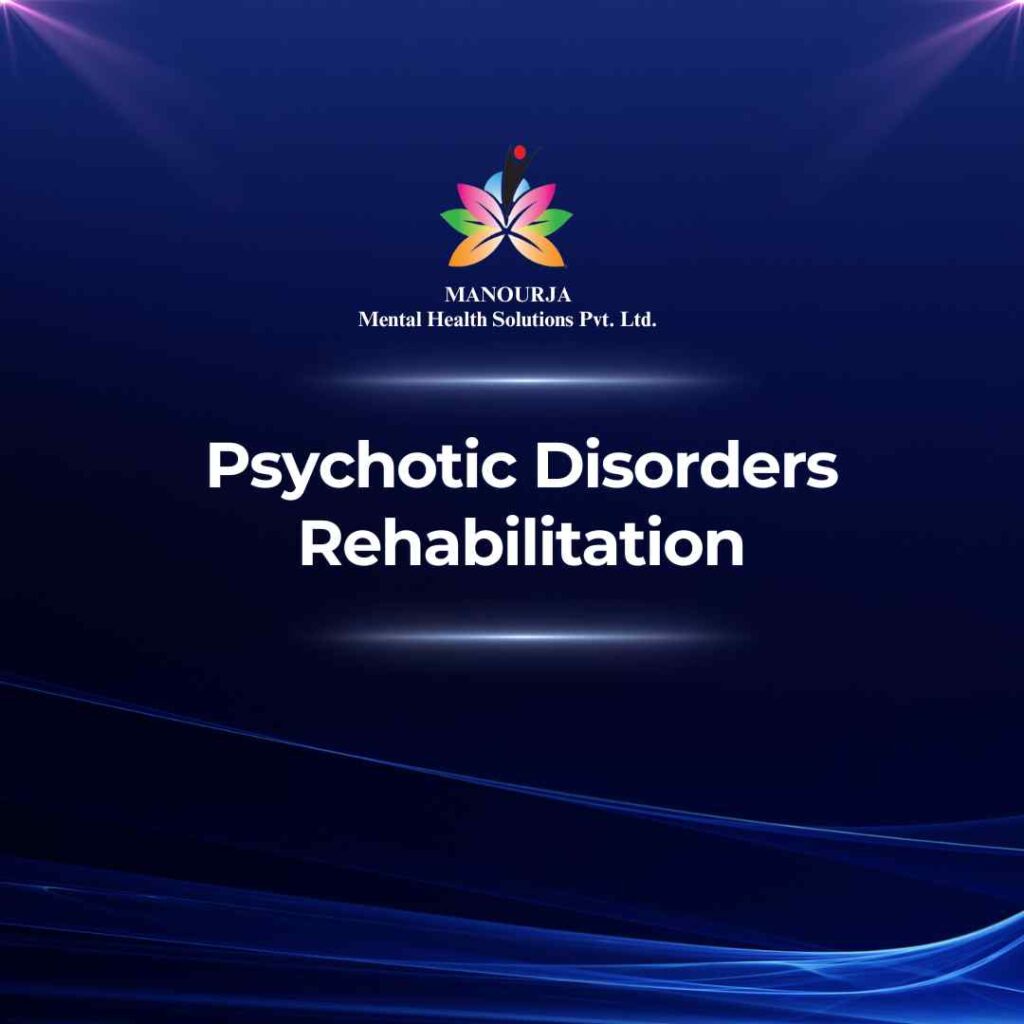Psychotic Disorders Rehabilitation

Psychotic disorders encompass a range of mental health conditions that affect a person’s perceptions and thoughts, leading to lost contact with reality. Common forms of psychotic disorders include schizophrenia, schizoaffective disorder, and brief psychotic disorder. These disorders can cause hallucinations, delusions, disorganized thinking, and other cognitive difficulties. Understanding the signs and symptoms, and recognizing the need for appropriate care—either outpatient (OPD) or inpatient (IPD) psychosocial rehabilitation—is crucial for effective management and recovery.
Signs and Symptoms of Psychotic Disorders
The following are common indicators of psychotic disorders:
- Hallucinations: Hearing voices, seeing things, or smelling things that are not present.
- Delusions: Firmly held erroneous beliefs, such as thinking one has extraordinary power or that they are being persecuted.
- Disorganized Thinking: Incoherent speech, jumping from one topic to another, or speaking in a way that makes little sense.
- Disorganized or Abnormal Motor Behavior: Unpredictable agitation or childlike silliness.
- Negative Symptoms: These might include reduced emotional expression, lack of motivation, and withdrawal from life.
Indicators for OPD vs. IPD Psychosocial Rehabilitation
Outpatient (OPD) Psychosocial Rehabilitation
- Suitable for individuals with mild symptoms that can be managed without daily clinical intervention.
- Effective for those who have a supportive home environment and a stable daily routine.
- Appropriate when symptoms are controlled well enough to not require constant supervision.
Inpatient (IPD) Psychosocial Rehabilitation
- Necessary for individuals experiencing severe symptoms such as profound delusions, hallucinations, or suicidal thoughts.
- Required if the individual poses a risk to themselves or others.
- Recommended when symptoms significantly impair daily functioning, making regular monitoring and intensive care essential.
Factors Influencing the Decision
- Severity of Symptoms: The intensity and impact of psychotic symptoms on daily functioning.
- Safety Concerns: Potential risks posed by symptoms to the individual or others.
- Support System: Availability and robustness of support systems that can help manage the condition.
- Previous Treatment Response: Effectiveness of prior outpatient treatments and the individual’s history of symptom management.
Role of Psycho-social Rehabilitation in Treating Psychotic Disorders
Psycho-social rehabilitation aims to improve the quality of life for individuals with psychotic disorders by:
- Building Life Skills: Enhancing coping mechanisms for dealing with everyday tasks and social interactions.
- Cognitive Remediation: Training programs to improve cognitive functions such as memory, attention, and problem-solving skills.
- Social Skills Training: Teaching and enhancing social interaction skills to facilitate better communication and relationships.
Techniques and Approaches Used at MANOURJA
The rehabilitation process at MANOURJA may include:
- Cognitive Behavioral Therapy (CBT): Aimed at addressing the relationship between thoughts, feelings, and behaviors, particularly targeting delusional beliefs and hallucinations.
- Art and Music Therapy: Utilized as therapeutic interventions to help express emotions and manage stress.
- Family Therapy: Involving family members to improve communication, address concerns, and educate them on how to support the individual.
Steps in the Rehabilitation Process at MANOURJA
- Initial Assessment: Detailed evaluation to determine the type and severity of the psychotic disorder.
- Personalized Treatment Planning: Tailoring interventions that meet the specific needs of the individual.
- Implementation of Treatment Strategies: Engaging the individual in various therapeutic activities and medical management.
- Regular Monitoring and Evaluation: Ongoing assessment of progress and adjustment of treatment plans as necessary.
- Community Integration and Support: Ensuring that the individual receives continued support post-treatment to maintain gains and prevent relapse.
Through psycho-social rehabilitation, individuals with psychotic disorders can regain significant control over their lives, improve their social functioning, and reduce the impact of their symptoms. The comprehensive care at MANOURJA is dedicated to helping individuals achieve these goals, enhancing their ability to live fulfilling lives despite the challenges of their conditions.
“Each day holds the possibility of a miracle, and every step forward makes you stronger.”
